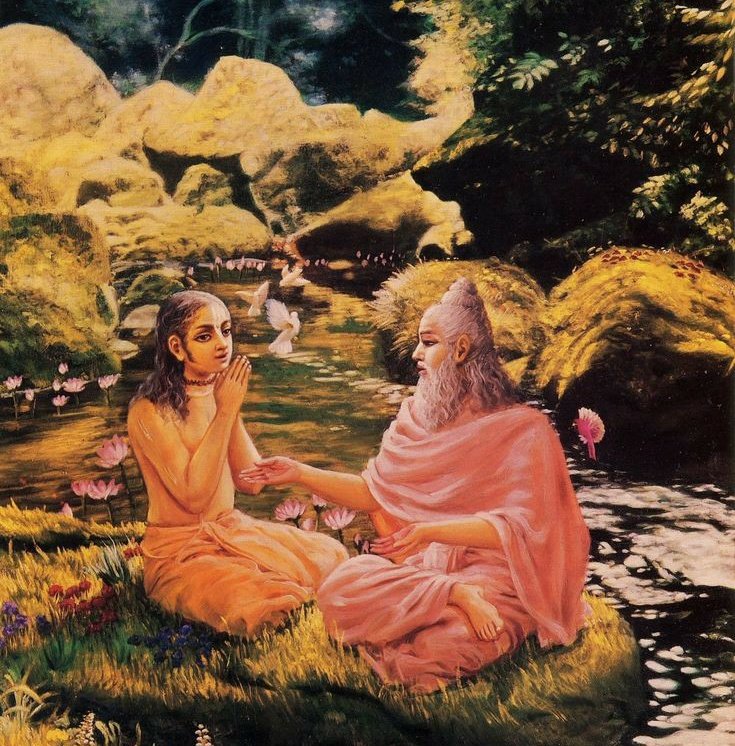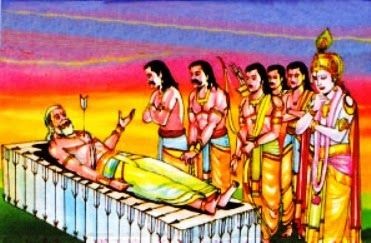खण्डः-V
Entering the portals of ŚrutiGītā:
#ŚrutiGītā means the song of the Śruti ~ Đ Upaniṣhads singing in ecstasy!
The very name 'Śruti Gītā' is significant.
It is not a dry philosophical treatise but a song or poetry about the Eternal.
(1/12)
Entering the portals of ŚrutiGītā:
#ŚrutiGītā means the song of the Śruti ~ Đ Upaniṣhads singing in ecstasy!
The very name 'Śruti Gītā' is significant.
It is not a dry philosophical treatise but a song or poetry about the Eternal.
(1/12)

Hence Rṣi Bhrigu calls the language of an enlightened Master as 'Samādhi Bhāsā'.
Upaniṣhads are Not mere books,
'Upa' means very near & 'Nishad' indicates abidance.
It is thr Knowledge which makes you abide in The Self ~
Đ Eternal,
Đ Immortal,
Đ Blissful,
Đ Whole.
Upaniṣhads are Not mere books,
'Upa' means very near & 'Nishad' indicates abidance.
It is thr Knowledge which makes you abide in The Self ~
Đ Eternal,
Đ Immortal,
Đ Blissful,
Đ Whole.
When an intimate contact happens with an Enlightened Master,
The Upaniṣhads work like magic herbs.
Hence the very meeting of a disciple with the Master is termed 'Upanayana'.
Divine destiny leads the seeker to the intimacy of the Rṣi,
& there his 'Upa-nayana'~Inner Eye Opens.
The Upaniṣhads work like magic herbs.
Hence the very meeting of a disciple with the Master is termed 'Upanayana'.
Divine destiny leads the seeker to the intimacy of the Rṣi,
& there his 'Upa-nayana'~Inner Eye Opens.

चक्षुरुन्मीलितं येन तस्मै श्रीगुरवे नमः।
(श्री गुरुगीता-24)
"The Master looks at the disciple not with the sense organ eye, but with the Supreme Infinite eye."
Hence the Vedas say,
सूर्यस्य त्वा चक्षु षानविक्षे।
"I behold you through the eye of the Sun".
(श्री गुरुगीता-24)
"The Master looks at the disciple not with the sense organ eye, but with the Supreme Infinite eye."
Hence the Vedas say,
सूर्यस्य त्वा चक्षु षानविक्षे।
"I behold you through the eye of the Sun".

उत्तिष्ठ ब्रुहन्भव।
Wake Up! Do not languish as this finite being.
Become the Infinite!
Wake Up, You are the Eternal.
(Taittiriya Aranyakam~4.3)
द्वितीयाद्वै भयं भवति।
(Bṛhadāraṇyaka Upaniṣad)
Fear leaves only when one knows that there is no Duality.
So the very purpose of
Wake Up! Do not languish as this finite being.
Become the Infinite!
Wake Up, You are the Eternal.
(Taittiriya Aranyakam~4.3)
द्वितीयाद्वै भयं भवति।
(Bṛhadāraṇyaka Upaniṣad)
Fear leaves only when one knows that there is no Duality.
So the very purpose of
the Upaniṣhads is to remove duality.
Then & only then are all sufferings erased.
Over the last few centuries, due to the influence of Tarka-Śāstra & later accretions,
Đ whole Vedānta-Śāstra has become very complex.
But there is No complexity at all in the Upaniṣhads themselves.
Then & only then are all sufferings erased.
Over the last few centuries, due to the influence of Tarka-Śāstra & later accretions,
Đ whole Vedānta-Śāstra has become very complex.
But there is No complexity at all in the Upaniṣhads themselves.
They are simple, very very simple.
As Swami Vivekananda says
'Truth is Simple. It is simple like your own existence.'
The very purpose of the Upaniṣhads is to reveal the Ātman.
A disciple goes to the Master, & the master guides the disciple to go Inward & recognise Đ Truth.
As Swami Vivekananda says
'Truth is Simple. It is simple like your own existence.'
The very purpose of the Upaniṣhads is to reveal the Ātman.
A disciple goes to the Master, & the master guides the disciple to go Inward & recognise Đ Truth.

That is what unfolds in the Upaniṣhads.
In Taittiriya Upaniṣhad, Bhrigu goes to Varuna & requests him to teach Brāhmaṇ.
Varuna says 'go & do Tapas, & through Tapas you will find it.'
Here, Tapas means deep enquiry with one's whole being.
Enquire Within & find wherefrom all
In Taittiriya Upaniṣhad, Bhrigu goes to Varuna & requests him to teach Brāhmaṇ.
Varuna says 'go & do Tapas, & through Tapas you will find it.'
Here, Tapas means deep enquiry with one's whole being.
Enquire Within & find wherefrom all

these elements have come.
That in which the world remains & unto which it goes back ;
यतो व इमानी भूतानी जयन्ते।
येन जतानी जिवंती।।
(Taittiriya Upaniṣhad~3.2.1)
But not satisfied with finding matter as the source,
He goes back & enquires deeper.
Each time he comes back &
That in which the world remains & unto which it goes back ;
यतो व इमानी भूतानी जयन्ते।
येन जतानी जिवंती।।
(Taittiriya Upaniṣhad~3.2.1)
But not satisfied with finding matter as the source,
He goes back & enquires deeper.
Each time he comes back &

reports Prāṇa (energy),
then Manaḥ (Mind),
then Vijñāna (insight or intelligence).
He remains unsatisfied with these as well.
Ultimately, He goes deep & touches the spring of Ānanda,
& the person no more comes back.
There he was established in the Infinite Peace;
then Manaḥ (Mind),
then Vijñāna (insight or intelligence).
He remains unsatisfied with these as well.
Ultimately, He goes deep & touches the spring of Ānanda,
& the person no more comes back.
There he was established in the Infinite Peace;
परमे व्योमन् प्रतिष्ठिता।
(Taittiriya Upaniṣhad~3.6.1)
'Whoever listens to this teaching will also get established in the Supreme Peace,' says Śruti.
य एवं वेद प्रतिष्ठाति:।
Whoever knows this, will also get established like Bhrigu.'
(Taittiriya Upaniṣhad~3.6.1)
'Whoever listens to this teaching will also get established in the Supreme Peace,' says Śruti.
य एवं वेद प्रतिष्ठाति:।
Whoever knows this, will also get established like Bhrigu.'

Thus the fruition of Spiritual quest is in the bliss of absolute fulfilment.
That should be the only goal of a Seeker.
to be Continued.,,
ll हरी ॐ तत् सत् ll
।। जयतु सनातन धर्मः।।🙏
Link for the खण्डः-i ii iii iv & v of Śruti Gītā 👇
That should be the only goal of a Seeker.
to be Continued.,,
ll हरी ॐ तत् सत् ll
।। जयतु सनातन धर्मः।।🙏
Link for the खण्डः-i ii iii iv & v of Śruti Gītā 👇
https://twitter.com/AdiShloka/status/1493544730801557505?t=hgp6_sEJKkXd_K7kHwCTEg&s=08
Correction:-
This is खण्डःVI of #ŚrutiGītā
This is खण्डःVI of #ŚrutiGītā
• • •
Missing some Tweet in this thread? You can try to
force a refresh









